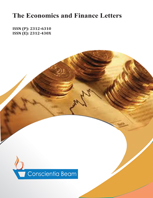The impact of FDI on economic growth in developing countries: the role of FDI inflow and trade openness
DOI:
https://doi.org/10.18488/29.v10i3.3519Abstract
This study examines the relationship between foreign direct investment (FDI) inflow, trade openness, and the influence of FDI on economic growth. The threshold methodology and GMM estimation are employed to analyze panel data from 60 developing countries in the period between 1995 and 2019. This study demonstrates the positive impact of FDI on economic growth in developing countries. However, the study also finds a significant threshold of FDI inflow relative to GDP that changes the impact of inward FDI on GDP growth. Regarding the role of trade openness, a significant threshold is found, which also indicates the absorptive capacity of the host countries. Moving from below to above this threshold, an increase in FDI inflow leads to a lower increase in economic growth. An increase in FDI relative to GDP stimulates growth only when the host country has sufficient absorptive capacity with regard to trade openness above the threshold. We suggest developing countries tighten the coherence of trade liberalization and FDI attraction policies to obtain the benefits of FDI and make changes to attract new investors when they succeed in attracting massive FDI inflows.

